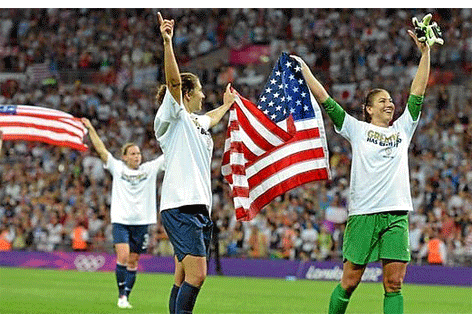
BBC Sport
How has London 2012 changed the sporting map of the world? The United States won the highest number of gold medals and the most medals in total, with China dropping to second place on the medals table after unprecedented dominance at their home Olympics in Beijing four years ago. Third place for Great Britain, exceeding all expectations and smashing a 2008 performance previously thought outstanding in its own right, had a knock-on effect for Russia as they fell out of the top three for the first time since the end of the Soviet era.
South Korea improved to fifth, their best finish since hosting the Games in Seoul 24 years ago, while Australia endured a comparatively miserable Olympics to take 10th place, their worst performance in two decades.
Here is a breakdown of how each nation won its medals, what the result might mean and how fans at home have reacted.
UNITED STATES This was the best-ever performance from a US team outside American soil, topped only by huge hauls of 78 golds at the St Louis 1904 Games and 83 at the boycotted Los Angeles Games of 1984.
Restoring the US to the top of the pile, and doing so comprehensively in terms of both Olympic titles and overall medals, had been the team’s ambition and delighted their “immensely proud” Olympic committee chief executive Scott Blackmun.
Swimming was far and away the biggest asset to the US team, contributing 16 gold medals, nine more than its nearest rival, athletics. Of those 16, Missy Franklin and Michael Phelps were responsible for four each, a result that puts the pair of them above the entire Australian team.
Beyond their traditional dominance on the running track and in the pool, what impresses about the US performance at London 2012 is its breadth. The team won titles in 15 separate sports, unmatched by any other nation.
- Chamisa under fire over US$120K donation
- Mavhunga puts DeMbare into Chibuku quarterfinals
- Pension funds bet on Cabora Bassa oilfields
- Councils defy govt fire tender directive
Keep Reading
And the ultimate feel-good factor was sealed on the Games’ final day as the US men ensured both basketball gold medals would head back across the pond.
United States medals
First place 46 gold medals 29 silver medals 29 bronze medals 104 medals in total Beijing 2008 Second. 36 gold, 38 silver, 36 bronze, 110 medals in total. Sydney 2000 First. 37 gold, 24 silver, 33 bronze, 94 medals in total. Seoul 1988: Third. 36 gold, 31 silver, 27 bronze, 94 medals in total.
CHINA The slip back into second place for China does not come as a surprise.
China’s own officials were keen to play down expectations before the Games, not least because — shorn of the advantage of being the hosts — the team was several hundred athletes lighter than that fielded in Beijing four years ago.
Funding had taken a similar dip.
When China won 51 gold medals at Beijing 2008, 38 of them came from only six sports — badminton, diving, gymnastics, shooting, table tennis and weightlifting. At London 2012, those sports supplied 27 golds — Chinese dominance still exists there, but not at the all-conquering level of their home Games.
In gymnastics, for example, China “only” won five gold medals compared to 11 in Beijing, while there were shocks in some disciplines China had been expected to wrap up with ease. For example, Qiu Bo missing out on gold in the men’s 10m platform diving.
Back in China, much has been made of perceived judging scandals and bias in the outcomes of some Olympic events, though little of this has filtered through into the Western press.
However, China does have one big success story from London 2012: swimming. Sixteen-year-old sensation Ye Shiwen and freestyle specialist Sun Yang, the nation’s first-ever male Olympic champion in the pool, led the way as China picked up five swimming gold medals, making a dent in traditionally US-held territory for the first time.
China medals
Second place 38 gold medals 27 silver medals 23 bronze medals 88 medals in total Beijing 2008 First. 51 gold, 21 silver, 28 bronze, 100 medals in total. Sydney 2000 Third. 28 gold, 16 silver, 14 bronze, 58 medals in total. Seoul 1988 11th. Five gold, 11 silver, 12 bronze, 28 medals in total.
GREAT BRITAIN You probably know this story by now. This is certainly the greatest Games for Britain in more than a century, and realistically the greatest-ever, given the only larger medal tally came in 1908, in London, when a third of all the competitors were British.
Against all the odds — rule changes, the loss of Britain-dominated events, reductions in riders per race — the GB track cycling team once again brushed aside all comers in the velodrome, winning seven gold medals and only failing to reach the podium in one of 10 events. That was the team sprint, where Victoria Pendleton and Jess Varnish were disqualified.
Rowing was the only other sport to bring in nine medals, four of them gold, while athletics contributed six medals (three of them gold in one all-star hour on the middle Saturday of the Games) and three sports added five: equestrian, boxing and sailing.
Gold medals came from 13 different sports as several made impressive breakthroughs, including canoe slalom, road cycling, triathlon and taekwondo.
Swimming, however, will be a concern and a review has already been launched after no Briton won a gold medal in the Aquatics Centre, with just one silver and two bronze medals to show.
Optimists may also conclude from London 2012 that the British team came within a whisker of at least five or six more Olympic titles. While nobody can seriously suggest a challenge for second place is on the cards, if funding levels are maintained and progress continues for the next four years, a successful defence of third place could be a realistic expectation.
Great Britain medals
Third place 29 gold medals 17 silver medals 19 bronze medals 65 medals in total Beijing 2008 Fourth. 19 gold, 13 silver, 15 bronze, 47 medals in total. Sydney 2000 10th. 11 gold, 10 silver, seven bronze, 28 medals in total. Seoul 1988 12th. Five gold, 10 silver, nine bronze, 24 medals in total.
RUSSIA Russia’s slide out of the top three may have more to do with other nations improving rather than any failings of their own team.
In raw medal-winning terms, Russia’s London 2012 performance marked an improvement on Beijing 2008, improving from 23 gold medals to 24 and up from a total of 73 medals to 82.
But, just as China’s sporting prowess rocketed in the years building up to Beijing, pushing Russia back, so the British bounce on the back of host-nation status saw GB leapfrog Russia into third.
No gold medals in weightlifting, where five silvers were won, will have been hard for the Russian team to bear, though athletics remained as strong as ever, bringing home eight golds and 18 medals overall, even without the likes of Yelena Isinbayeva contributing gold as expected. Three Russians won gold in judo, famed as President Vladimir Putin’s favourite sport.
Russia medals
Fourth place 24 gold medals 26 silver medals 32 bronze medals 82 medals in total Beijing 2008 Third. 23 gold, 21 silver, 29 bronze, 73 medals in total. Sydney 2000 Second. 32 gold, 28 silver, 29 bronze, 89 medals in total. Seoul 1988 (as Soviet Union) First. 55 gold, 31 silver, 46 bronze, 132 medals in total.











